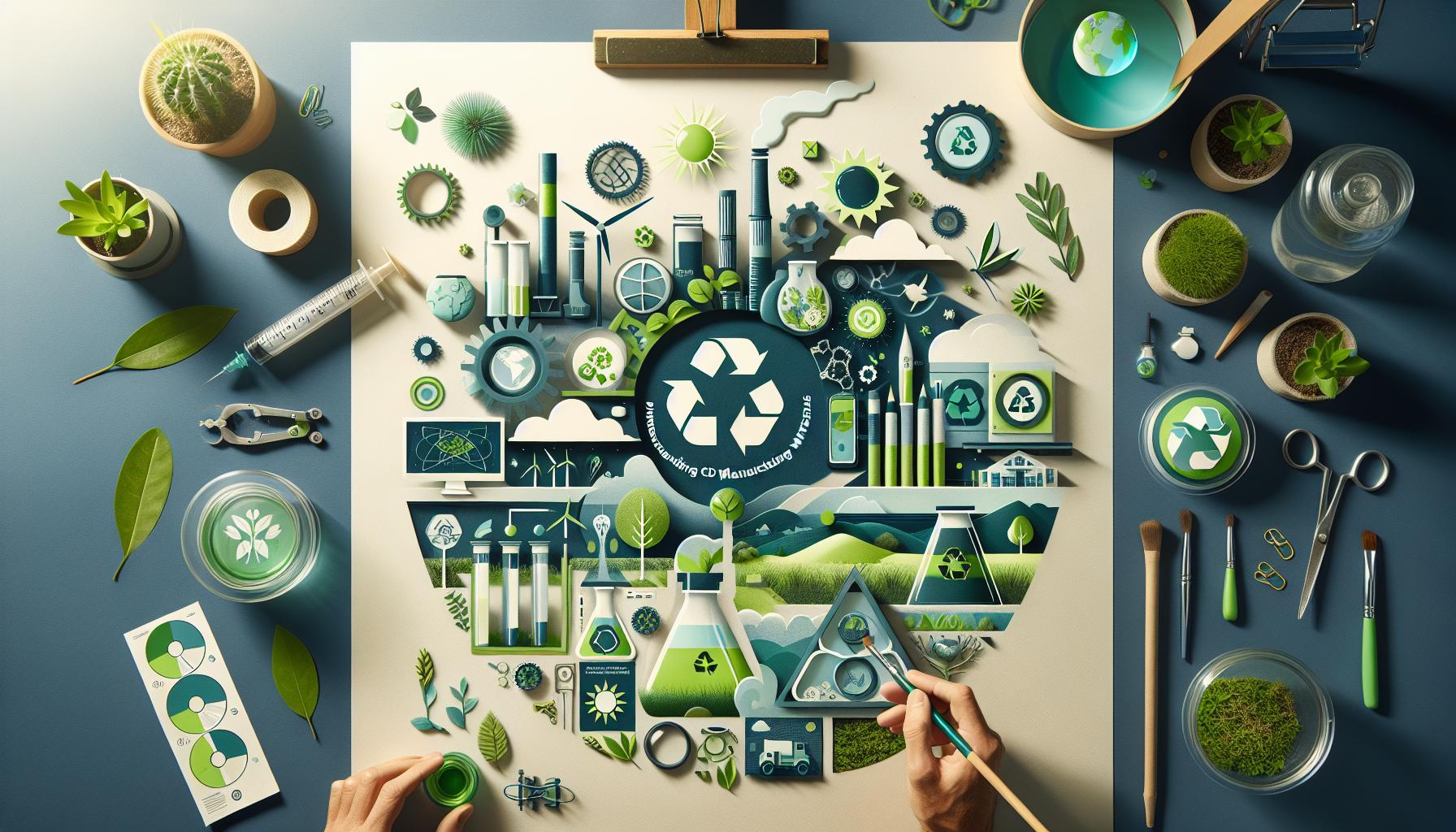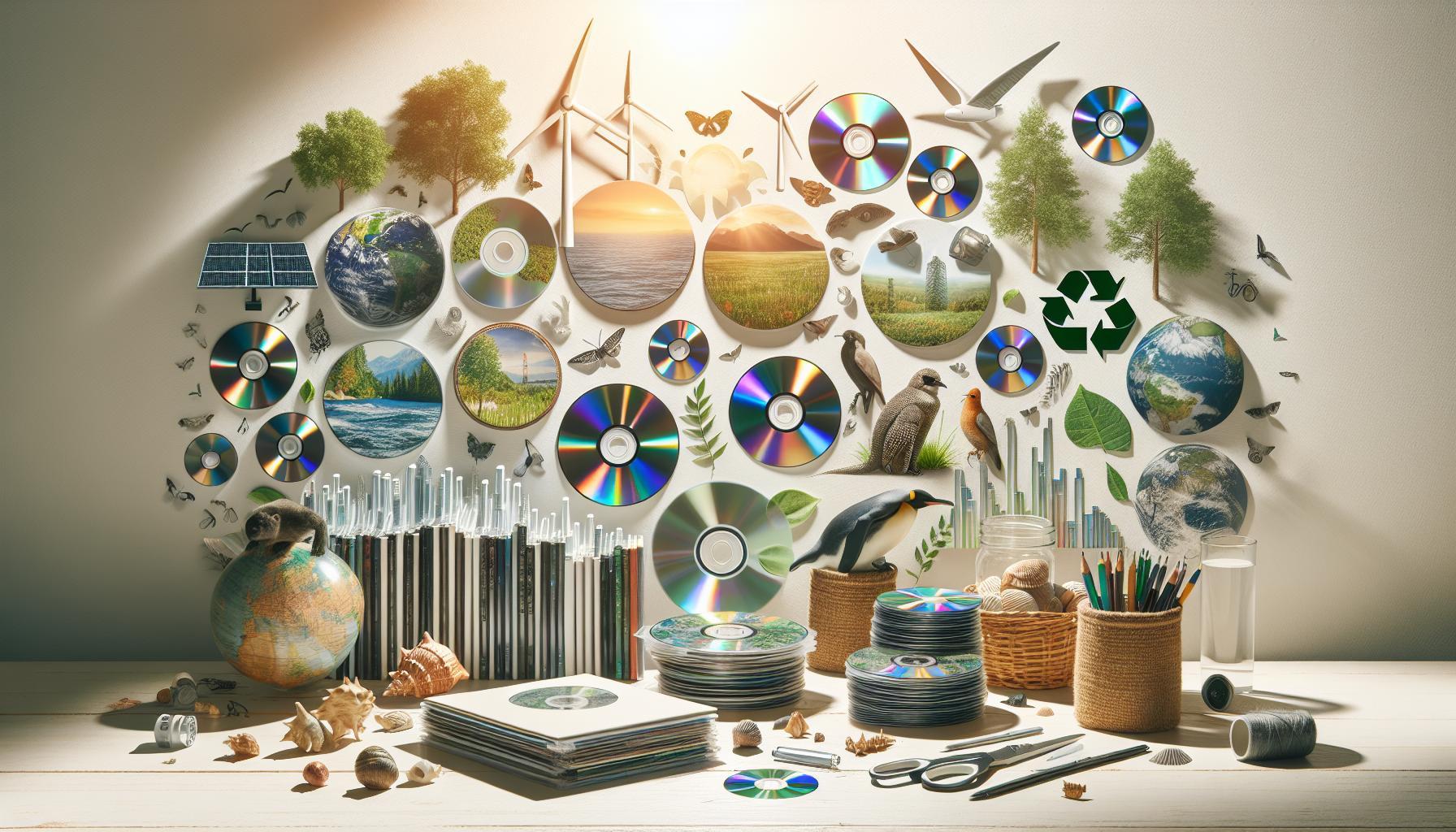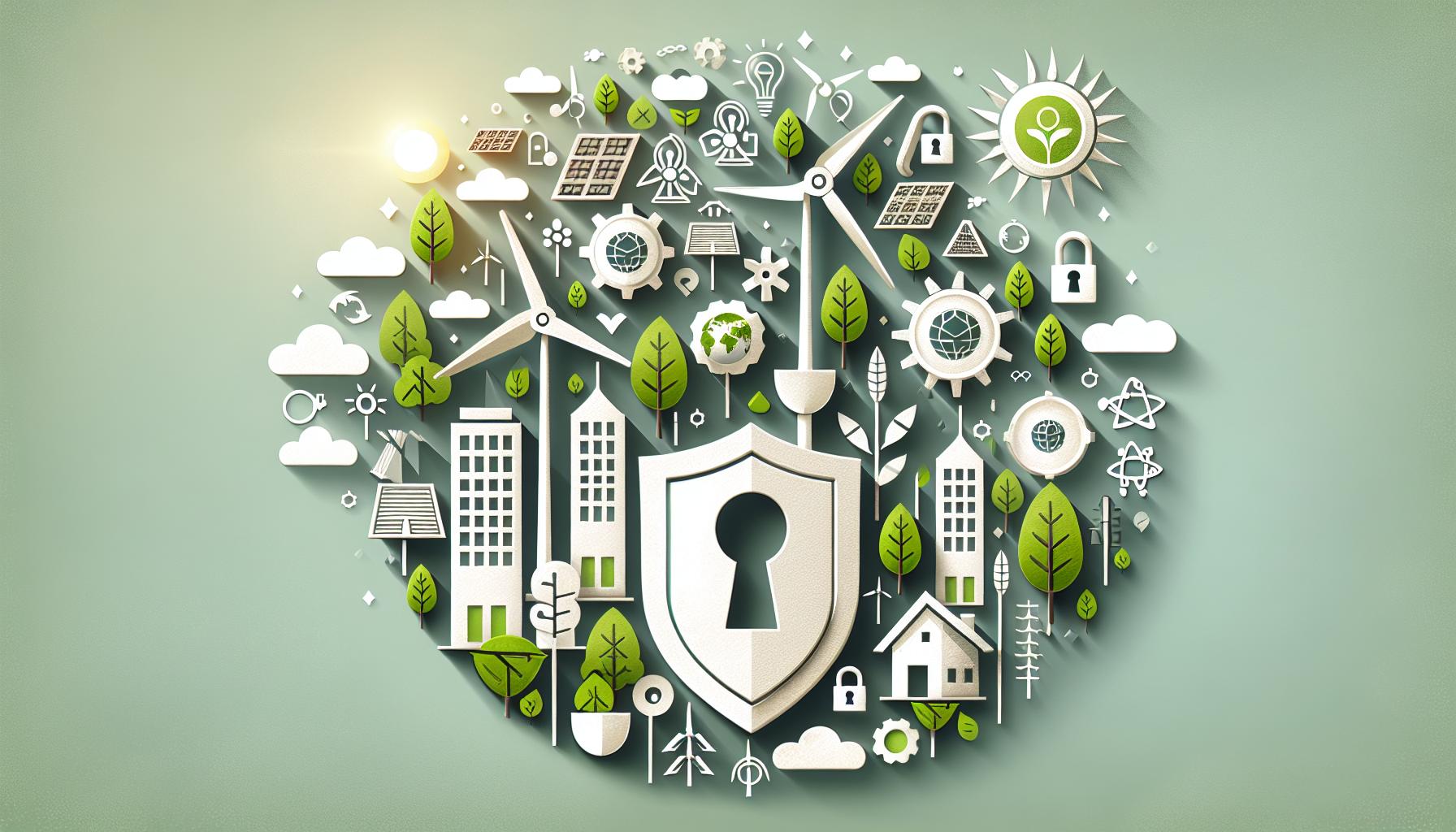In an age of digital streaming and instant access, you might wonder what to do with those old CDs gathering dust. Surprisingly, millions of these discs end up in landfills each year, contributing to environmental waste. Understanding whether CD discs are recyclable is crucial not only for reducing waste but also for taking responsibility for our consumption habits.
This guide will explore the recyclability of CDs and provide practical steps for their responsible disposal. Whether you’re decluttering your home or aiming to make environmentally-conscious choices, knowing how to dispose of digital media properly can empower you to contribute to a healthier planet. Join us as we shed light on sustainable options for your outdated media and learn how your choices can make a difference.
Are CD Discs Truly Recyclable?
CDs, those shiny discs that once ruled the music and data landscape, are not merely waste to be tossed aside. While many people might assume that CDs are not recyclable due to their plastic construction and the metallic layers that help them store data, the reality is more nuanced. CDs are indeed recyclable, but the process requires specialized facilities that can handle the unique materials used in their manufacturing, making it essential to know where and how to properly recycle them.
Understanding the Recyclability of CDs
CDs are primarily composed of polycarbonate plastic, along with a thin reflective layer of aluminum or other metals. The plastic can be melted down and reformed into new products, while the metals can be recovered and repurposed. However, many conventional recycling programs do not accept CDs because they can interfere with the sorting and processing machinery typically used for other types of plastics. Therefore, it’s crucial to seek out recycling centers that specifically mention electronics or media recycling, such as those highlighted by organizations like Certified Recycling, which actively disassembles and recycles CDs as part of their broader electronic waste recycling efforts [[3](https://certifiedrecycling.org/electronics-recycling/)].
Maximizing the Recycling Process
To ensure that you are making a positive impact when recycling your CDs, consider these steps:
- Research local recycling options: Many areas have dedicated electronic waste recycling programs that can handle CDs.
- Participate in mail-back programs: Some companies offer services to mail your CDs for recycling.
- Remove packaging materials: Before recycling, remove any cases or labels from the CDs as these may not be recyclable.
By being informed about the recyclability of CDs and utilizing the right recycling methods, you can contribute to minimizing plastic waste and supporting a more sustainable environment. In the broader context of digital media disposal, it plays a crucial role in reducing landfill contributions and emphasizing the importance of responsible recycling practices.
Understanding CD Manufacturing Materials
The materials used in the manufacturing of CDs are a critical aspect of understanding their recyclability. Primarily, CDs are crafted from polycarbonate plastic, a high-performance thermoplastic that offers durability and clarity for optical media. This specific type of plastic is widely used because of its robustness and resistance to breakage. Additionally, the reflective layer that enables data storage is usually made from aluminum or other metal coatings. This combination makes CDs versatile for data storage but also presents unique challenges for recycling.
The presence of polycarbonate plastic means that CDs can be melted down and reformed into new products, such as plastic containers, automotive parts, or even new CDs. However, the reflective coating complicates this process since traditional recycling facilities are not equipped to handle mixed materials effectively. As a result, many local curbside recycling programs do not accept CDs, leading to a prevalence of misinformation regarding their recyclability. Recognizing this limitation empowers consumers to seek dedicated recycling options specifically tailored for electronic waste.
When considering the broader scope of environmental impact, it’s important to note that the production of CDs and other forms of media also involves significant energy consumption and emissions. Each stage, from extracting raw materials to manufacturing and distribution, leaves an ecological footprint. As a solution, some companies are now exploring alternative materials for producing discs, such as biodegradable plastics, aiming to reduce the environmental burden.
To make a positive impact, individuals can take proactive measures to ensure their old CDs are handled responsibly. Seeking out special recycling drives or electronic waste facilities that specifically mention the ability to recycle CDs can effectively divert these items from landfills. Programs that focus on the safe dismantling and recycling of electronic media not only contribute to resource recovery but also promote a circular economy where materials are reused, reducing the need for new raw materials. Engaging with community initiatives that address electronic waste can further enhance awareness and collective action towards sustainable disposal practices.
The Environmental Impact of CDs and Digital Media
The journey of CDs from production to disposal encompasses significant environmental ramifications that are often overlooked. With an estimated 100 billion CDs produced globally since their inception, the burden of these discarded discs contributes greatly to plastic waste. is multifaceted, influencing not only waste management practices but also broader ecological issues ranging from plastic pollution to energy consumption.
Energy Consumption and Pollution
Manufacturing CDs requires substantial energy and resources. From the extraction of raw materials to the complexities of the production process, each equipment and transport step adds to the energy footprint. Additionally, traditional manufacturing methods often involve toxic chemicals, contributing to air and water pollution. As society shifts towards more digital consumption, it’s essential to recognize that while CDs may seem obsolete, their production and subsequent disposal still have lasting effects on the planet.
Plastic Waste and Recycling Challenges
The primary material used in CDs, polycarbonate plastic, presents formidable challenges for recycling. As many local recycling programs do not accept CDs, they often end up in landfills, where they can take hundreds of years to decompose. The mixed materials-primarily plastic and aluminum-make it difficult for recycling facilities not specifically designed for e-waste to process these items effectively. Consumers are left grappling with where and how to dispose of their old media responsibly.
- Community Recyclers: Many communities have specialized recycling events or electronic waste days specifically aimed at collecting CDs and other media.
- Retail Trade-Ins: Some retailers offer programs to trade in unwanted discs for store credit, allowing consumers to reduce waste and embrace a circular economy.
- Creative Reuse: Beyond recycling, CDs can be repurposed in arts and crafts, from decorative items to practical applications like garden ornaments.
Towards Sustainable Digital Practices
As consumers increasingly turn to digital media, the emphasis must remain on utilizing eco-friendly practices for disposal. Digital formats significantly reduce physical waste, but they also come with their own set of challenges; data centers powering these platforms consume vast amounts of energy. Advocating for green practices in digital media, such as promoting energy-efficient data storage or utilizing renewable energy sources for data centers, paves the way toward a more sustainable future.
Ultimately, addressing requires collective awareness and action. With community engagement and innovative recycling solutions, individuals can help mitigate the ecological footprint of this prevalent form of media. By making informed choices and advocating for better practices in both physical and digital realms, we can contribute to a greener, more sustainable future.
How to Properly Dispose of CDs
Disposing of old CDs might seem trivial, but the environmental implications of improper disposal can be profound. While many people may simply toss their unused discs in the trash, that can contribute to the growing plastic waste problem. Thankfully, there are several responsible options for disposing of CDs that not only reduce landfill contributions but also promote recycling and reuse practices.
One effective way to handle old CDs is to participate in community recycling events. Many local waste management facilities organize special electronic waste collection days where residents can drop off not just CDs, but also other electronic media and devices. These events help ensure that the materials are processed appropriately, and often they are recycled or reused by certified e-waste recyclers. For those who cannot wait for a designated event, researching local recycling centers that accept CDs is a proactive step; some facilities specialize in e-waste and will have the necessary resources to handle discs properly.
Additionally, retail trade-in programs are becoming more common, where consumers can exchange their unwanted CDs for store credits at various music or electronics retailers. This not only encourages recycling but also gives a second life to the material-fostering a circular economy. For those who prefer a more creative approach, old CDs can be transformed into various crafts or decorative items, from coasters to garden ornaments, providing a personal touch while keeping waste to a minimum.
By exploring these options, you can play an active role in managing media waste. Making informed choices when it comes to the disposal of CDs can result in significant environmental benefits and inspire others in your community to rethink their waste habits. Clever reuse and participation in recycling programs can help mitigate the impact of sinking CDs into landfills-a small effort that contributes to a greater ecological good.
Creative Ways to Reuse Old CDs
Finding can not only spark joy through your ingenuity but also significantly reduce waste. Instead of allowing those shiny discs to languish in landfills, consider transforming them into unique and functional items around your home. The reflective surface of CDs lends itself to a variety of projects that can incorporate both art and utility, making your old music and data storage an exciting part of your decor or daily life.
Crafty Projects
Old CDs can be crafted into a multitude of decorative items. For instance, you can create stunning coasters by simply gluing felt or cork to one side. This not only protects your surfaces but also adds a colorful touch to your living space. Additionally, with some paint and creativity, they can be transformed into beautiful wall art or mobiles, catching light and casting enchanting patterns around a room. This kind of recycling not only gives your CDs a second life but also allows your personal tastes to shine through your creations.
Garden Enhancements
CDs can also serve a functional purpose in your garden. They can be used as reflective deterrents to keep birds away from your plants. By hanging them in strategic locations, the sunlight’s reflection can help protect your crops. Alternatively, you can slice CDs into pieces to create eye-catching garden decorations or to mark plant rows, adding a whimsical touch to your gardening efforts.
Practical Household Uses
Beyond crafts and decorations, there are practical uses for old CDs. For instance, glued together, they can form sturdy and unique trivets for your hot pots and pans. You can also use them to organize your cables and chargers; simply wrap your cords around a CD to keep them tangle-free. If you’re a pet owner, consider using them as makeshift fetch toys; the lightweight nature and smooth surface make them easy for dogs to carry and retrieve.
By repurposing old CDs in these innovative ways, you’re not only preventing them from ending up in a landfill but also engaging in sustainable practices that encourage creativity and resourcefulness. Embracing such mindful habits can inspire those around you to rethink their disposal methods and contribute positively to a community-focused approach to waste reduction.
Recycling Options: Where to Take Your CDs
While many people may question whether CD discs are truly recyclable, the good news is that there are several effective options for disposing of them responsibly. Many local recycling programs do not accept CDs due to the materials they are made from, but there are specialized facilities that can properly process these discs, ensuring hazardous materials do not end up in landfills.
If you’re looking for places to take your old CDs, start by checking with local waste management departments or recycling centers. Some facilities may have electronic recycling days specifically focused on items like CDs, DVDs, and other media. You can also visit websites such as The Recycle Guide, which provides a nationwide search tool to find certified recycling centers [[1]]. This resource can connect you with environmentally responsible centers that handle electronic waste.
Another option is to explore retail programs. Some electronics stores and large retailers offer in-store recycling for CDs and other electronic items. It’s worth calling ahead or checking their websites to see if they have such programs available. Alternatively, specialized organizations focus on media recycling; these often provide mailing options where you can send your discs in to be recycled properly.
Participating in community programs or events designed to reduce e-waste is another great avenue to explore. Often, local councils will hold e-waste collection days, providing an excellent opportunity for residents to dispose of old CDs along with other electronic materials. By utilizing these resources and programs, you are not only helping the environment but also promoting a culture of recycling and responsible disposal in your community.
The Role of E-Waste in Modern Recycling
The rise of digital media has introduced complex challenges regarding electronic waste, particularly with materials like CDs, DVDs, and other storage formats. As the modern world increasingly shifts towards digital, the repercussions of electronic waste on the environment have become more pronounced. Studies show that electronic devices are not merely outdated junk; they contain valuable metals and materials that can be repurposed, yet improper disposal can lead to environmental degradation and health risks.
E-waste encompasses a range of discarded electronic devices, but it’s critical to recognize that not all components are created equal. Items like CDs, which often contain polycarbonate plastic and metals like aluminum, require specialized recycling processes. Most municipal recycling programs may not accept these, leading to considerable amounts ending up in landfills, where they can leach harmful substances over time. As consumers, understanding how to navigate e-waste disposal-through local recycling events, designated facilities, or even retail take-back programs-empowers individuals to act responsibly and minimize their ecological footprint.
To foster a circular economy, several organizations are working to develop comprehensive e-waste recycling programs. Initiatives that focus on educating the public about electronic waste disposal not only promote environmental stewardship but also highlight the importance of recovering materials to reduce the need for virgin resources.
In this digital age, staying informed about recycling options and advocating for robust e-waste policies is vital. Each action taken towards responsible disposal contributes to a larger movement of creating sustainable systems that protect our environment for future generations. By choosing to recycle CDs and other digital media correctly, you’re not just preventing waste; you’re playing a role in a crucial global effort to manage resources more effectively.
Sustainable Alternatives to CDs and DVDs
In an age increasingly defined by digital streams and downloads, the question of how to move away from traditional media storage formats, such as CDs and DVDs, is more relevant than ever. With over 1 billion CDs sold annually at their peak, the reliance on these physical formats has significantly declined due to the evolution of digital media. However, the transition to digital doesn’t solely resolve the waste issue; it invites a need for sustainable alternatives that reduce our ecological footprint and ensure we handle the remaining physical media responsibly.
To start, embracing digital platforms offers a sustainable alternative to the physical storage of music, videos, and documents. Services like Spotify, Apple Music, and various cloud storage options allow users to access an extensive library of content without the need for physical discs. By shifting to these platforms, not only do we decrease reliance on CDs but we also minimize the associated environmental impacts of manufacturing and disposing of physical media. It’s a winner for both the user and the planet.
Moreover, for those who still possess CDs or DVDs, consider options like digital conversion services. Many businesses and nonprofits provide services to rip and convert disc content into digital formats. Once converted, the physical copies can either be recycled at specialized facilities dedicated to e-waste or reused creatively. For example, old CDs can be transformed into art, coasters, or garden decorations, giving them a new lease on life rather than allowing them to contribute to landfill waste.
Lastly, advocating for responsible electronic waste management policies-such as local recycling programs or community take-back events-can aid in fostering a culture that prioritizes sustainability. Getting involved in initiatives that provide information on e-waste disposal not only helps mitigate the effects of electronic waste but also promotes awareness among peers. This approach creates a community dedicated to reducing environmental impacts while reinforcing the benefits of transitioning towards more sustainable practices in our digital age.
Digital Media: Eco-friendly Practices for Disposal
In an era where sustainability is at the forefront of consumer consciousness, understanding how to dispose of old CDs and other media responsibly becomes crucial. Many people wonder about the eco-friendly practices available for eliminating physical media, especially as digital alternatives gain popularity. Although CDs seem innocuous at first glance, their life cycle presents a significant environmental challenge if not handled properly.
One effective approach to responsible disposal is finding your local recycling options. Many communities have specialized e-waste recycling centers that accept CDs along with other electronic waste. This not only ensures that the materials are handled correctly but also reduces the risk of harmful substances leaching into the environment. For example, in some cities, local recycling programs may even provide curbside pick-up for electronic waste, making it easier than ever to participate in eco-friendly practices.
Additionally, digital conversion is a fantastic avenue to embrace sustainability. Many organizations offer services to convert CD content into digital formats, allowing you to keep your favorite media while freeing up physical space. After conversion, the Optimum goal is to recycle the disc at an approved facility, preventing it from ending up in a landfill. It’s a win-win scenario that transforms old physical items into accessible digital content.
Besides recycling and conversion services, consider the impact of small actions within your community. Initiatives such as hosting or attending electronic waste collection drives can raise awareness about responsible disposal practices and create a network dedicated to reducing media waste. Community engagement not only amplifies individual efforts but also fosters shared responsibility toward a more sustainable future. By embracing these eco-friendly practices, we can collectively minimize the environmental footprint of outdated media formats.
Legislation and Guidelines for Electronic Waste
In many regions, electronic waste (e-waste), including CDs and DVDs, is increasingly recognized as a significant environmental concern, leading to the establishment of legislation aimed at reducing its impact. The rise in popularity of digital media has not only transformed how we consume content but has also prompted lawmakers to take a serious look at the environmental implications of the materials used in traditional media formats. The management of e-waste is governed by various local, national, and international regulations designed to promote responsible recycling practices and reduce pollution.
One notable example is the European Union’s Waste Electrical and Electronic Equipment (WEEE) Directive, which mandates that member states must ensure the proper collection, treatment, and recycling of e-waste. Under this legislation, consumers are encouraged to return end-of-life electronics to designated collection points-making it easier to recycle items like CDs, which often contain toxic substances that can leach into the environment if not disposed of properly. In the United States, specific states have taken the initiative to pass similar laws; for instance, California’s Electronic Waste Recycling Act requires manufacturers to fund the recycling of consumer electronics, reinforcing the idea that producers share responsibility for their products’ life cycles.
To help consumers navigate the landscape of e-waste disposal, it is beneficial to stay informed about local regulations and guidelines. Here are some practical steps to consider:
- Research local recycling laws: Familiarize yourself with your state or municipality’s guidelines on e-waste disposal, especially regarding CDs and DVDs.
- Locate certified recyclers: Identify e-waste recycling facilities in your area that are certified to handle electronic products, ensuring they follow proper environmental protocols.
- Participate in community e-waste events: Many local governments organize collection drives for electronic waste, providing an excellent opportunity to responsibly dispose of old CDs.
By adhering to these guidelines, individuals not only contribute to environmental sustainability but also support community efforts to educate others about the importance of responsible electronic waste management. Engaging with local recycling initiatives can initiate meaningful discussions about the broader context of media waste, inspiring others to take actionable steps towards reducing their environmental impact. Ultimately, staying informed and proactive in the face of evolving legislation empowers consumers to make responsible choices and become advocates for sustainable practices.
Consumer Awareness: Reducing Media Waste
In an age where digital streaming dominates, it’s easy to overlook the environmental consequences of physical media. Did you know that, in the U.S. alone, it is estimated that millions of CDs are discarded each year, contributing significantly to waste and pollution? Raising awareness about the impact of our media consumption habits is essential in paving the way for a more sustainable future. Every consumer has the power to make a difference by understanding how their choices influence the environment.
To reduce media waste effectively, individuals can take several proactive steps. First and foremost, consider digital alternatives whenever possible. Streaming services, e-books, and digital music downloads not only save physical space but also eliminate the need for CD production, packaging, and eventual disposal. When physical media is necessary, opt for purchasing from second-hand stores or borrowing from libraries to extend the life cycle of existing CDs rather than contributing to new production.
Practical Steps for Reducing Media Waste
Here are some practical suggestions for reducing media waste:
- Educate Yourself: Stay informed about the environmental implications of different media formats. Understanding what materials CDs are made from and their effects can motivate more sustainable choices.
- Repurpose and Recycle: Get creative with old CDs! They can be transformed into coasters, art, or even used in garden projects as reflective objects to deter birds. Additionally, look for local recycling programs that accept CDs, ensuring they are processed sustainably.
- Participate in Community Initiatives: Many communities host e-waste recycling days. Getting involved not only helps with proper disposal but also raises awareness among peers about responsible media consumption.
- Advocate for Change: Engage in discussions about sustainable media practices in your community. Sharing knowledge and advocating for better recycling options can inspire others to consider their impact.
By taking these steps, consumers can actively contribute to reducing media waste and its associated environmental impacts. Every small action, from educating oneself to recycling properly, makes a collective difference in fostering a culture of sustainability. Ultimately, fostering a deeper understanding among consumers about the journey of media products-from production to disposal-empowers them to make smarter, eco-friendly choices.
Future Trends in Digital Media Disposal
As society increasingly turns to digital formats, the future of media disposal is shifting dramatically. With millions of CDs, DVDs, and similar formats reaching the end of their life cycle, opportunities for sustainable disposal are becoming both essential and innovative. One emerging trend is the rise of specialized recycling programs aimed at handling electronic waste more efficiently. These programs not only provide a means to recycle often-nonrecyclable materials but also educate consumers about eco-friendly disposal practices, helping to mitigate the growing concern of media waste.
Technological advancements are also playing a crucial role in how we dispose of and recycle media. For instance, innovations in material science are leading to the development of more environmentally friendly packaging and discs made from biodegradable materials. This shift could potentially reduce future waste significantly. Additionally, businesses are now exploring the concept of circular economies, where old media can be reclaimed and repurposed into new products. Such initiatives not only lessen waste but also create economic opportunities through job creation in recycling and refurbishment sectors.
Furthermore, community engagement is essential in shaping . Local governments and organizations can promote e-waste collection drives, allowing residents to drop off unwanted media easily. These initiatives often come with educational components that empower the public with knowledge regarding the importance of proper disposal and recycling practices. By participating in these events, individuals can contribute to a collective effort in reducing media waste while also fostering a culture of responsibility around electronic consumption.
As consumers become more conscious of their environmental footprint, there is an increasing demand for transparency in media production and disposal. This growing awareness has prompted companies to implement voluntary take-back programs for their products, ensuring a complete life cycle from production to disposal. This shift not only satisfies consumer demand for sustainability but also sets a precedent in corporate responsibility. By embracing these trends, both consumers and businesses can foster a more sustainable future in digital media management and disposal.
Frequently asked questions
Q: Are CD discs recyclable?
A: Yes, CD discs are recyclable, but they cannot be placed in standard curbside recycling bins. Instead, they need to be taken to specialized recycling centers that accept them. Many electronics recycling facilities offer options for disc recycling, ensuring that plastics and metals are properly processed and reused.
Q: How can I recycle my old CDs and DVDs?
A: To recycle old CDs and DVDs, locate a local electronics recycling center or a special collection event. Some stores and organizations may also accept discs for recycling. For an eco-friendly alternative, consider mailing them to a company that specializes in recycling CDs, such as GreenCitizen [1].
Q: What happens to CDs during the recycling process?
A: During the recycling process, CDs are first sorted and then mechanically shredded. Materials such as plastics and metals are separated and processed for reuse. This prevents plastic pollution and reduces landfill waste [2].
Q: Can I dispose of my CDs in the trash?
A: While you technically can dispose of CDs in the trash, it is not environmentally responsible. CDs can take a long time to decompose in landfills, contributing to plastic pollution. It is always better to recycle them properly [2].
Q: What alternative uses do old CDs have?
A: Old CDs can be repurposed for various DIY projects, such as creating coasters, mirrors, or art pieces. You can also use them as garden decorations or bird repellent by hanging them to reflect sunlight [1].
Q: Where can I find a recycling program for CDs?
A: You can find recycling programs for CDs at local electronics recycling centers, and some municipalities offer special pick-up services for electronic waste. Websites like GreenCitizen provide information on where to recycle CD discs [1].
Q: Are there any fees associated with CD recycling?
A: Most community recycling programs do not charge fees for dropping off CDs, but some specialized services may charge a small fee for handling electronic waste. It’s best to check with local facilities for their pricing policies [3].
Q: Why is it important to recycle CDs?
A: Recycling CDs is important as it helps reduce plastic pollution and conserves resources. Proper disposal prevents materials from ending up in landfills, supporting environmental sustainability, and reducing the need for new raw materials [1].
For more information on how to responsibly dispose of digital media, feel free to explore additional resources or engage with our community to learn more!
To Wrap It Up
Now that you’ve explored the ins and outs of recycling CD discs, remember that every small action counts towards creating a sustainable future. If you haven’t already, check out our detailed guide on how to responsibly dispose of other electronic media, like DVDs and cassette tapes, to further your eco-friendly efforts. For those looking to dive deeper, our resources on local recycling centers and innovative repurposing ideas await you!
Don’t let your old CDs gather dust-take that important step now! Whether it’s finding a local recycling drop-off or exploring creative upcycling projects, your choices make a difference. Share your thoughts below, and let us know how you are contributing to a cleaner planet. For more insights, sign up for our newsletter or explore our related articles to keep informed about sustainable practices and products. Together, we can lead the charge towards a greener tomorrow!





